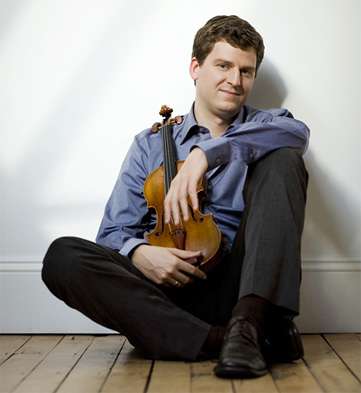|
Back
Tchaikovsky’s Unplayable Concerto and More Miami
New World Center
01/08/2012 -
Sergei Prokofiev: The Love for Three Oranges, op. 33: March and Scherzo (*)
Pyotr Ilyich Tchaikovsky: Violin Concerto in D major, op. 35
Hector Berlioz: Suite from Roméo et Juliette, H 79
James Ehnes (violin)
New World Symphony, James Conlon, Joshua Gersen (*) (conductors)

J. Ehnes (Courtesy of NWS)
South Floridian music lovers are very lucky people. Since 1987 we have had the New World Symphony. Then we get guest conductors like James Conlon who are respectful enough to give us both one of the warhorses along with a piece that isn’t offered very often. This is really what matters. The trick is to bait us with something we love and then expand our musical education. The bait this time is one of the most beloved violin concertos, the Tchaikovsky. It has often been commented that when violinist Leopold Auer was chosen to premiere it, he declined saying it was “unplayable.” Now that 130 years have passed, it still might seem to merit Auer’s description. Only the superhuman should tackle something this technically demanding. It is amazing how many violinists survive the battle. In all fairness, experiencing this concerto can be pretty darned taxing on the audience, too. The emotions run very high and many begin weeping even from the opening notes. Though not tears of sadness; quite the opposite, tears of joy.
And it is a particular joy to have a violinist as mesmerizing as James Ehnes. This guy is only 35 yet has a resumé that reads like someone who is close to retirement. It can be a thrill to see a performer who is very physically animated sawing away at his instrument giving us his all. Then there is an artist like Ehnes who does not give us all the histrionics and with his dedication and love for the piece makes it all sound fresh reminding us why Tchaikovsky is sui generis. And Conlon gives the audience a new approach. The tempos seem slower in places yet the tension never sags. How great it would be if there were people in the audience as young as those on stage. A few even younger, with their parents, could be seen. This is the sort of performance that sparks a person’s love for classical music; and each of us has a story about that moment.
Following the concerto, Conlon gave a very thoughtful introduction to the next piece, a suite based on themes from Berlioz’s “symphonie dramatique” Roméo et Juliette. If an orchestra were going to offer the complete piece with all vocal parts, it would most probably make up the entire program. Conlon obviously loves it and can gauge an audience’s limitations. So he created the suite from some of the orchestral parts; in truth, most people would find these more illuminating than the vocals which tend to feel rather labored. There is no question that even in its reduced version this work is still quite daunting and not immediately accessible to everyone. Yet there are many moments, particularly in the Balcony Scene when the music is stunning. Poor Berlioz never really succeeded in the world of music theatre. His operas are dense and in order to be best appreciated the audience is expected to bring considerable knowledge with them. It is difficult to passively enjoy Berlioz as background music. The man was way ahead of his time and like Conlon explained, the influence of Roméo et Juliettewould soon be heard in many Wagner operas as well as the work of Franz Liszt. This piece was a great choice for the New World Symphony. The demands are intense, particularly for the strings and it is clear that Mr. Conlon knew they were up to it. Since the work is seldom offered, it is possible that many of the orchestra members might never again encounter it; something for all to be proud of. Thanks for the opportunity, Mr. Conlon.
Another thing that is so moving about attending performances at the New World Symphony is the theatricality that accompanies the orchestra’s onstage arrival. We might feel as though we are attending a graduation as the musicians make their way to the stage holding their instruments in a manner that is deliberately choreographed.
And what could be a more appropriate way to start the evening than the March and Scherzo from The Love for Three Oranges in a very tight and bright performance conducted by New World conductor in training, Joshua Gersen. Too bad the piece is so short but it gave a solid kickoff to a demanding afternoon.
Jeff Haller
|